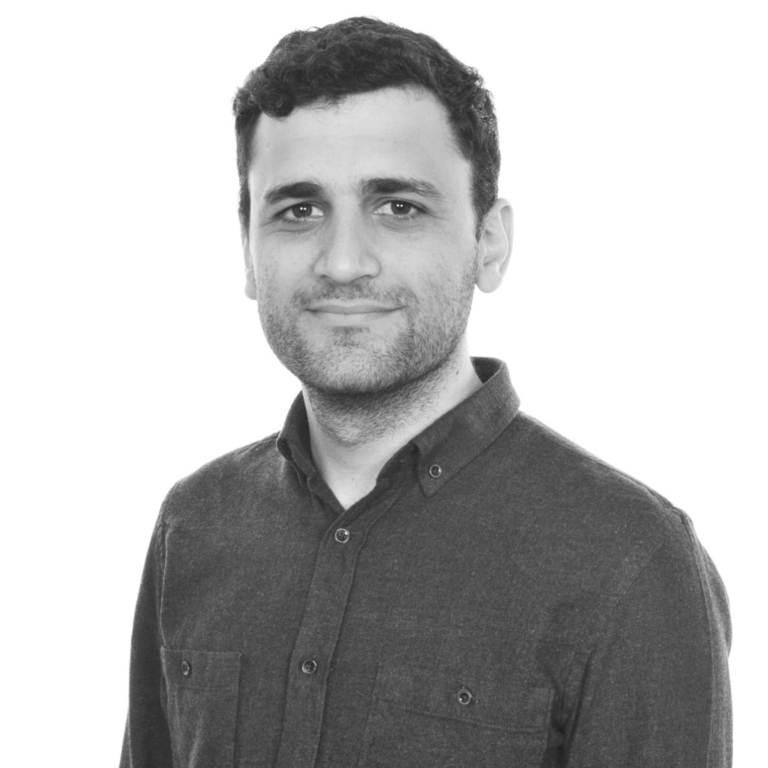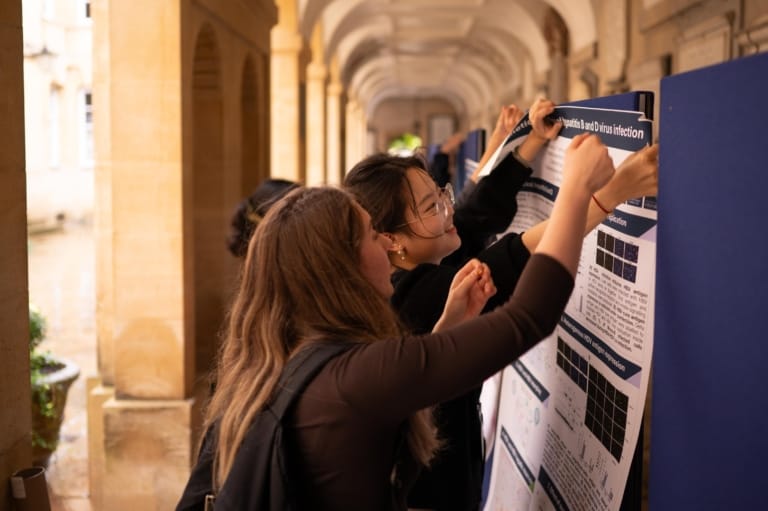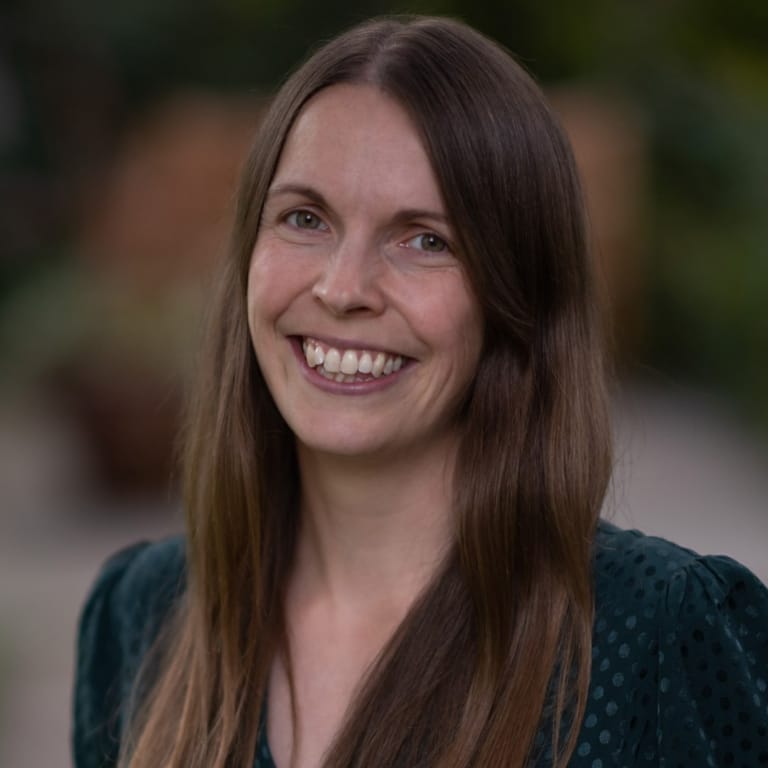During the Lister Annual Meeting, we caught up with three of our Lister Summer Students and their supervisors to learn about both sides of the experience. The students joined us in Oxford to present posters on what they achieved during the summer placements, and to enjoy the celebrations before returning to a new university term.
David Bending and Faniya Abeed
Faniya is a student at the University of Birmingham starting her master’s in 2024. David is a current Lister Fellow also based at the university. Faniya’s summer project looked at how immune checkpoint proteins regulate the activation of T cells in the context of two newly-approved melanoma treatments.

Faniya: I was told about the Lister Institute by a friend who is also a Summer Student. He advised me to look on the website and message someone whose work I was interested in. I messaged David and he replied the next day inviting me in for a meeting. We confirmed the studentship the same day. Coming to the Annual Meeting is surreal, as a student – to be able talk to people so high up in the field and hear what they thought about my work.
David: This is the second time I’ve had a Lister Summer student, and he also came on and did a master’s degree afterwards. It’s brilliant for students to get that experience in a lab environment, in a way you probably wouldn’t on a taught course. There isn’t anything other than the project to do, so you can really immerse yourself in it. It can also give you the edge in a competitive field.
Faniya: Our project looked at the combination of two drugs to see if they were better together than when used alone. It will be very useful for my master’s, getting used to the lab beforehand. I’ve learned most of the techniques I was expecting to use in my master’s so that’s great – it’s given me a push start.
David: Currently we’re working in vitro and in mouse models, but for Faniya’s master’s project she’s going to look at human T cells and bloods taken from current patients.
Faniya: I loved working in the lab – the people there are all amazing. I’m so grateful to David for giving me the opportunity. I learned a lot that you wouldn’t normally learn at uni. When you actually go into a lab, you don’t just learn the techniques, you also learn how the lab works. I’ve learned a lot of things I am going to need in the future when I’m applying for jobs or PhDs.
Joana Neves and Keshav Rao
Keshav is an undergraduate student at UCL. Joana is a current Lister Fellow based at King’s College. Keshav’s summer project investigated interactions between immune cell cytokines and gut organoids.

Keshav: I saw Joana’s profile on the King’s Centre for Host-Microbiome Interactions when I was looking for research experience over the summer. I emailed her and she invited me to her lab meeting that week.
Joana: I learned about the Lister Summer Studentships at last year’s annual meeting, when I was a new Fellow. So when Keshav showed interest in coming to work with me for the summer, things nicely fit together.
Keshav: This has been my first experience in a working laboratory and I really liked it. Everyone in the lab is very accommodating and I have to thank Joana and my other supervisor in the lab, Emma, who is a PhD student. I am now quite set on applying for a PhD. I wanted the experience because I was considering applying, and after working in the lab and seeing all the interesting intricacies of that, my decision was made.
Joana: it was great to have Keshav working with Emma, who had some experiments that were technically more easy for someone starting out and they worked very well together. Keshav presented work in one of our live meetings and did an excellent job. I am very impressed with his poster.
Keshav: I would recommend the Lister Summer Studentship to anyone between second and third year. It’s good that you get funding as a student too, so you don’t have to sacrifice something you’re interested in because you have to work over the summer. Especially in London, that can be quite tough.
Joana: It’s also great that students can come to the Annual Meeting, see the talks and experience the networking and the conference environment. I think this worked very well and I would consider having a summer student again, especially someone who is proactive and takes the initiative to approach me.
Shoba Amarnath and Ruby Glazebrook
Ruby is an undergraduate student at Newcastle University. Shoba is a current Lister Fellow also based at Newcastle. Ruby’s summer project analysed immune cells in liver cancer for heterogeneity.

Shoba: Connecting with Ruby was serendipitous, because her supervisor works on the same floor as my laboratory and mentioned that Ruby was interested in a summer studentship. She reached out to me the November before, sharing a summary of our research. The entire laboratory was like: we need her! Then when the Lister Summer Studentships were advertised, I asked her to apply and that was that.
Ruby: I am going into my third year at Newcastle this year (2024)
Shoba: She came first in the second year out of all the students. They have a big biomedical school.
Ruby: I was quite proud of myself. Before the studentship I wasn’t sure if I wanted to do a PhD, but now I am. Hopefully after my bachelor’s degree if I can. Hopefully this experience has helped me get closer to being ready for the PhD. Being in a working lab is very different from university practicals, because you’re not just doing what’s on the programme, you’re researching something you’re actively interested in. I learned a lot more about general lab work and upkeep too. It was really interesting and completely different.
Shoba: I would of course have another student based on this experience. Ruby is absolutely phenomenal. She came in, learned to do our coding, and worked with our PhD students doing things she’d never done before. She is a great team player and got along with everybody. Hopefully she can come back and do a PhD with us.
About the Lister Summer Studentships Programme
The annual funded summer programme is part of our mission to nurture future leaders in biomedical research. It provides students with an insight into a future scientific career through hands-on work experience, while giving Fellows and former Fellows additional lab support.
The programme is usually undertaken by students in between their second and third year of undergraduate study. To apply, students contact a current or former Lister Fellow who then requests funding for the project. The bursary per student is £2,900 for a studentship of a minimum of six weeks (maximum ten weeks).
Applications for summer 2025 will open in January and the deadline for Fellows submitting an application will be 30 May 2025.
Find more details about the programme and see how to apply on our Summer Studentships webpage.



